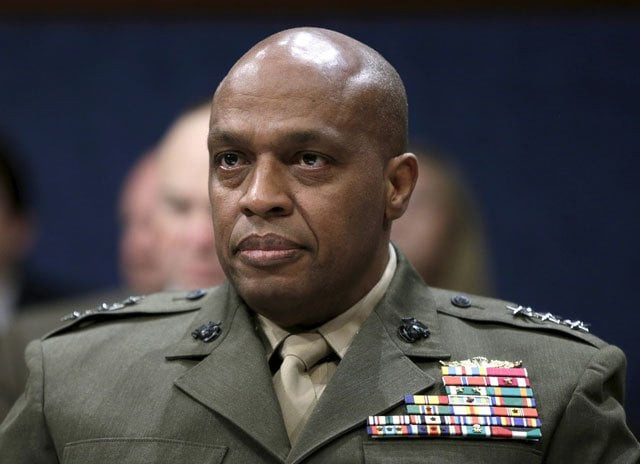Military operations helped reduce violence in Pakistan: US defence intel chief
Lt-Gen Stewart says Islamabad is fast improving nuclear security and is aware of extremist threats to its arsenal

Lt-Gen Vincent R Stewart claimed Pakistan will face internal security threats from militants and separatist groups in the current year. PHOTO: REUTERS
“Counter-insurgency operations along Pakistan’s western border and paramilitary operations in Karachi have had successes in reducing violence and are likely to continue,” US Defence Intelligence Agency Director Lt-Gen Vincent R Stewart said in his testimony to the Senate Armed Services Committee, according to the Times of India.
Zarb-e-Azb has reduced militants' ability to use Pakistan soil: US commander
However, Stewart claimed Pakistan will face internal security threats from militants and separatist groups in the current year. “Islamic State’s branch in Afghanistan-Pakistan and al-Qaeda in the Indian subcontinent will remain significant security concerns for Islamabad,” he said.
The US intelligence director, however, upheld that the country is fast improving its nuclear security and is aware of the threats posed by extremists to its nuclear arsenal. “Islamabad continues to take steps to improve its nuclear security, and is aware of the threat presented by extremists to its programmes.”
Expressing concern over Pakistan’s evolving tactical nuclear weapons doctrine, Stewart warned about the increasing risks of an incident associated with the growing nuclear stockpile. “Pakistan’s nuclear weapons continue to grow. We are concerned that this growth, as well as the evolving doctrine associated with tactical weapons, increases the risk of an incident or accident,” the spymaster said.
Instability in Pakistan can impact nuclear security, says US Congressional report
In January, a US Congressional report had estimated Pakistan’s nuclear warheads to be between 110-130 and that they are aimed at deterring India from taking military action against it “Pakistan’s nuclear arsenal probably consists of approximately 110-130 nuclear warheads, although it could have more,” the Congressional Research Service report said.
This article originally appeared on The Times of India.



















COMMENTS
Comments are moderated and generally will be posted if they are on-topic and not abusive.
For more information, please see our Comments FAQ